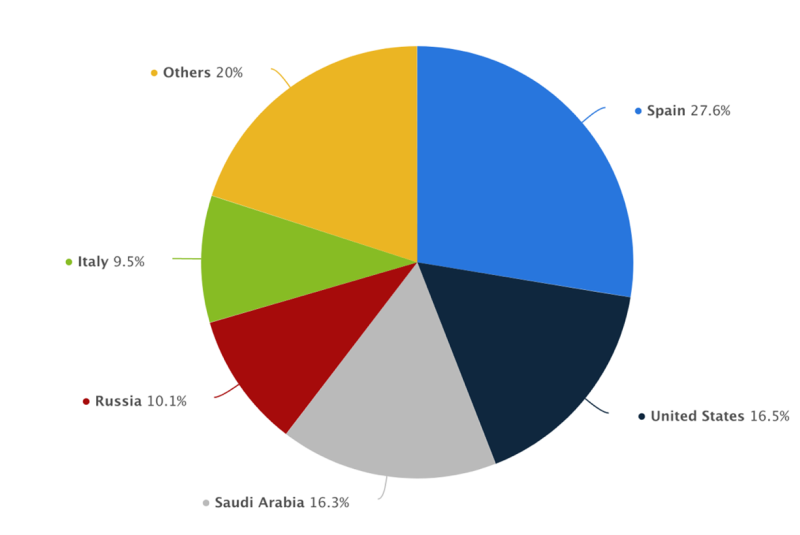NewMed Energy is expanding Israel’s gas footprint in Morocco after having signed an 8-year deal for a 37.5% stake in the offshore Boujdour Atlantique exploration and production license area in the North Atlantic.
Adarco Energy Ltd. (a Moroccan firm registered in Gibraltar in May) will also hold a 37.5% stake in the license area located in the southern part of Morocco’s offshore economic zone. The Moroccan Ministry of Energy and Mining will retain 25%, according to a NewMed press statement on 6 December.
Assuming regulators in Morocco approve the deal, the partners will have 2½ years to conduct geological and geophysical analysis, including reprocessing of seismic data, after which exploration drilling would begin.
In December 2020, Morocco became the fourth Arab country to normalize relations with Israel following signing of the Abraham Accords. The accords opened the door first to Israel’s Ratio Petroleum which signed an agreement with the Moroccan government in October 2021 to explore the Dakhla Atlantique block.
Ratio was given 2 years under a research agreement to reprocess existing seismic data and conduct initial data interpretation to map prospects for future exploration of the 109,000-km2 block in water depths exceeding 3,000 m, according to Ratio’s website.
NewMed-Capricorn Merger Benefits Its Moroccan Business
In the Boujdour Atlantique license area, NewMed (a subsidiary of Israel’s Delek Group, previously known as Delek Drilling) will benefit from its acquisition of Capricorn Energy which is expected to close in early 2023. Capricorn (known as Cairn Energy before rebranding a year ago) had already explored parts of Boujdour Atlantique together with Kosmos Energy, a US independent headquartered in Dallas.
In 2015, Kosmos, acting as operator with a 55% stake in the venture, reported that “the CB-1 exploration well located in the Cap Boujdour permit area offshore Western Sahara had penetrated approximately 14 m of net gas and condensate pay in clastic reservoirs over a gross hydrocarbon-bearing interval of approximately 500 m,” but the discovery was deemed “noncommercial” and “the well was plugged and abandoned.”
Though its partnership with Kosmos ended in 2018, Capricorn learned many lessons as a result of the partnership that will benefit its tie-up with NewMed, a merger that creates an influential new independent gas producer targeting the Eastern Mediterranean and North Africa with a 43.5% stake in Israel’s giant Leviathan offshore gas field and a supporting role in advancing Egypt’s quest to become a regional energy hub for gas, LNG, and renewables.
NewMed’s Chief Executive Yossi Abu said during the company’s 3Q earnings call at the end of November that the merger is expected to close in Q1 2023, and the new melded businesses will list on the London Stock Exchange as “NewMed Energy.”
Barclays analyst Tavy Rosner called the merger “a potential positive for NewMed” because it will enable the company “to finally list its shares on the London Stock Exchange and access that exchange's wider pool of capital,” Reuters reported, quoting Rosner as saying that the merger will also “leverage Capricorn’s global experience and track record as an explorer and upstream operator.”
NewMed Energy Leaning Toward Floating LNG Expansion
In 2023 the company will “significantly speed up Leviathan's expansion and entry into new markets, while strengthening collaboration with our customers in Israel, Egypt, and Jordan," Abu told Reuters.
NewMed will “take an investment decision early next year” on a $550-million plan to build a new pipeline to its platform to boost production capacity to around 14 Bcm a year from the current 12 Bcm, Abu said, adding that the company is “targeting to be (at) 21 Bcm within this decade.”
Abu also said that the company is leaning more toward building a floating LNG (FLNG) terminal for Leviathan as opposed to linking the field by pipeline to LNG terminals in northern Egypt along the Mediterranean coast. FLNG “is really where we are heading right now,” Abu told analysts.
Morocco is similarly inclined. The country currently imports 90% of its energy in the form of fossil fuels—oil, gas, and coal, according to the World Bank. In June of this year, Spain’s gas operator Enagás began supplying natural gas to Morocco through the Maghreb-Europe Gas (MEG) Pipeline, according to local press reports.

Spain first imports the gas as LNG and then regasifies it for further export by pipeline to Morocco. Algeria had stopped selling pipeline gas to Morocco because of political tensions between the two countries, but Spain was able to step in as an alternative supplier after reversing the MEG flows.
In 2021, Morocco called for “expressions of interest” from companies which could develop an FSRU (floating storage and regasification unit) off the Atlantic coast to handle direct LNG imports which will be part of Morocco’s strategic plan for energy security.
The initial scope of Morocco’s FSRU project posits an annual requirement of 1.1 Bcm by 2025, rising to 1.7 Bcm in 2030, and 3 Bcm in 2040, according to the most recent country commercial report prepared by the US Department of Commerce, International Trade Administration.


